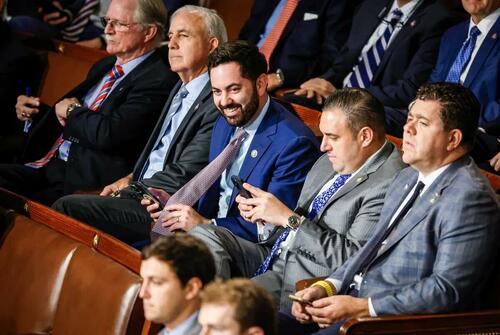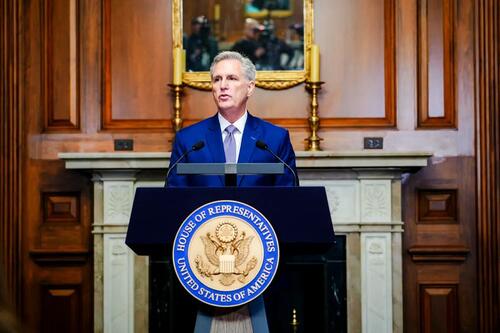Key Moments From The 118th Congress
Authored by Joseph Lord, Jackson Richman & Stacy Robinson via The Epoch Times (emphasis ours),
The 119th Congress of the United States will officially sit for the first time on Jan. 3, 2025 – marking the official close of the particularly tumultuous and divided 118th Congress.

The Congress was defined by ideological splits among House Republicans, whose narrow majority meant that everything—from who held the speaker’s gavel to how the government would be funded—was on the line, and Republicans needed broad agreement to advance any course of action.
With President Joe Biden in the White House and Democrats in control of the upper chamber, partisan divisions were also especially pronounced.
While Republicans mounted investigations into the administration and executive officials, Democrats broke records in the Senate for judicial confirmations.
Aside from the compromise deals that resulted from House Speaker Kevin McCarthy (R-Calif.) and House Speaker Mike Johnson’s (R-La.) negotiations with Democrats—largely related to financial issues—there were few major legislative agreements during this Congress.
Here are the highlights of the 118th Congress as it concludes its final days.
1. House Republicans’ Razor-Thin Majority
Ideological divisions among House Republicans were the main story of the 118th Congress—due in large part to the razor-thin majority the party held in the lower chamber.
Splits between conservatives and moderates have always defined the party. With such a narrow margin in the House, the impact of these divisions was substantially magnified. Republicans could only afford a small handful of defections on partisan votes. That meant that members of both major GOP factions were able to hold an outsized influence on the most controversial bills.
Those dubbed moderates—members like Reps. Mike Lawler (R-N.Y.), John Duarte (R-Calif.), Juan Ciscomani (R-Ariz.), and others—showed a willingness to break with their party when they thought the majority was pushing too far.
The conservatives—members like Reps. Matt Gaetz (R-Fla.), Marjorie Taylor Greene (R-Ga.), and Cory Mills (R-Fla.)—pushed for leadership to go further in forcing financial and other concessions from Democrats.
These splits were compounded by irregular but impactful interventions by then-candidate Donald Trump, who enjoys a far greater influence in the House than in the Senate.
In the House Rules Committee, which considers the rules governing votes and debate on bills, conservatives like Reps. Thomas Massie (R-Ky.), Ralph Norman (R-S.C.), and Chip Roy (R-Texas) often tanked legislation that came before the panel.
Massie opposed a short-term spending bill in September intended to avert a government shutdown. The bill later passed under suspension.
Suspension of the rules, under which a bill can pass the House without passing the Rules Committee, became a mainstay in the 118th Congress due to the challenges posed by Massie, Norman, and Roy on the Rules panel.
The consequences of Republicans’ ideological split were visible from the first sitting of the 118th Congress in January 2023, when it took 15 ballots over five days for McCarthy to be named speaker.
A recognized leader in the House Republican conference since the early 2010s, McCarthy was considered the heir apparent to the speakership on the day the 118th Congress first sat.
However, many Republicans were unhappy with McCarthy. His most prominent critic was Gaetz, with others like Roy, Norman, Rep. Bob Good (R-Va.), and others opposing the California Republican.
McCarthy’s conservative credentials were questioned, and he was seen by his critics as too aligned with the establishment and unable to effectively lead GOP opposition to the Biden administration.
The votes dragged on for days, raising questions about McCarthy’s ability to win.
Ultimately, Gaetz and other holdouts relented, voting “present.”
But that came at a cost, as these conservatives forced several key concessions from McCarthy—a return to the one-member motion to vacate the chair, seats on the Rules Committee for conservatives, and budget-related concessions.
While McCarthy was able to clinch a narrow victory, it may have been a pyrrhic one in the end—and it set the tone for the 118th House moving forward.
While Democrats and Republicans rarely worked together during the Congress, certain budget issues—particularly the debt ceiling and government funding—required compromises.
In 2023, the House GOP passed the Limit, Save, Grow Act to lift the debt ceiling by $1.5 trillion while implementing significant fiscal and other reforms.
Even conservative Republicans backed it due to its features: clawing back COVID funds, reducing energy regulations, revoking green energy, and strengthening some federal welfare requirements.
However, this package was unable to pass Congress due to Democrats’ opposition. Instead,
Congress ultimately agreed to the Fiscal Responsibility Act—a compromise between McCarthy and Biden—to suspend the debt ceiling until January 2025.
Aside from suspending the debt ceiling, it reclaimed unspent COVID funds, capped non-defense discretionary spending, strengthened federal welfare requirements, and streamlined energy permitting.
This bill—which 71 Republicans opposed—further disenchanted some Republicans with McCarthy’s handling of the speakership.
The compromise means that the issue will come up again in the opening months of Trump’s second term, and it may require negotiations with Democrats to raise or suspend the ceiling again, though the GOP could raise the debt ceiling through reconciliation, which would avoid the need to overcome the filibuster and therefore any Democrat votes. On the other hand, Trump has called for abolishing the debt ceiling.
While the 118th Congress didn’t get much done in the way of major legislation, one issue came up again and again: government funding.
To fund the government every year, each chamber of Congress must pass 12 appropriations bills by Sept. 30 to keep agencies running. Failure to do so triggers a government shutdown, when only essential services and personnel are retained.
But many conservative House Republicans take a firm stance against any spending they perceive to be wasteful and have historically refused to back government funding plans that could win Democrats’ support.
That made it difficult to reach an agreement on any of the funding bills—particularly as the Democratic Senate was opposed to substantial spending cuts.
This led leadership to rely on a slate of stopgap government funding bills, dubbed a “continuing resolution” (CR) in Washington-talk.
The year 2024 saw multiple CRs passed, the latest of which squeaked through on Dec. 20, just hours before the deadline.
The CR passed on Dec. 20 was the “plan C” version of the bill, which extends government funding until March 14. The first attempt was a massive 1500-page package that failed amid opposition by Trump and others; the second was much shorter, coming in at 118 pages.
It didn’t include any provisions related to the debt ceiling, a last-minute demand put forward by Trump in an effort to avoid a showdown on the issue during his term.
It was a CR, ultimately, that cost McCarthy the gavel and his spot in Congress.
During his relatively short time in the speaker’s chair, McCarthy faced heightened scrutiny from conservative Republicans, who felt he had failed to win acceptable concessions from Democrats or to fight on budget issues.
After McCarthy backed a continuing resolution on Sept. 30, 2023, these criticisms came to a head.
Gaetz, an outspoken McCarthy critic, brought to the floor a motion to vacate the speaker’s chair. That motion was possible only through a rule change that allowed a single member to bring such a resolution to the floor—one of the multiple rule changes McCarthy agreed to in order to win the job.
Seven other Republicans joined all Democrats to oust McCarthy, who became the first-ever speaker to be deposed by the mechanism.
This led to three weeks of paralysis as Republicans tried to find a replacement. Three candidates, including Majority Leader Steve Scalise (R-La.), House Judiciary Committee Chairman Jim Jordan (R-Ohio), and Majority Whip Tom Emmer (R-Minn.) each unsuccessfully sought the top spot.
Ultimately, Rep. Mike Johnson (R-La.)—until then a little-known lawmaker—was able to win enough support to be named speaker, in part, Republicans have said, because his personality made him popular with moderates and conservatives alike.
McCarthy ultimately left Congress in December 2023.
In May, it looked as though Johnson too might be removed, a push led this time by Greene; as in the case of McCarthy, Greene’s resolution was based on Johnson’s decision to pursue a CR with Democrats.
However, Greene’s effort didn’t gain momentum, and it failed after Democrats joined Republicans to table the motion to vacate.
Read the rest here…
Tyler Durden Thu, 01/02/2025 – 09:05
Source: https://freedombunker.com/2025/01/02/key-moments-from-the-118th-congress/
Anyone can join.
Anyone can contribute.
Anyone can become informed about their world.
"United We Stand" Click Here To Create Your Personal Citizen Journalist Account Today, Be Sure To Invite Your Friends.
Before It’s News® is a community of individuals who report on what’s going on around them, from all around the world. Anyone can join. Anyone can contribute. Anyone can become informed about their world. "United We Stand" Click Here To Create Your Personal Citizen Journalist Account Today, Be Sure To Invite Your Friends.
LION'S MANE PRODUCT
Try Our Lion’s Mane WHOLE MIND Nootropic Blend 60 Capsules
Mushrooms are having a moment. One fabulous fungus in particular, lion’s mane, may help improve memory, depression and anxiety symptoms. They are also an excellent source of nutrients that show promise as a therapy for dementia, and other neurodegenerative diseases. If you’re living with anxiety or depression, you may be curious about all the therapy options out there — including the natural ones.Our Lion’s Mane WHOLE MIND Nootropic Blend has been formulated to utilize the potency of Lion’s mane but also include the benefits of four other Highly Beneficial Mushrooms. Synergistically, they work together to Build your health through improving cognitive function and immunity regardless of your age. Our Nootropic not only improves your Cognitive Function and Activates your Immune System, but it benefits growth of Essential Gut Flora, further enhancing your Vitality.
Our Formula includes: Lion’s Mane Mushrooms which Increase Brain Power through nerve growth, lessen anxiety, reduce depression, and improve concentration. Its an excellent adaptogen, promotes sleep and improves immunity. Shiitake Mushrooms which Fight cancer cells and infectious disease, boost the immune system, promotes brain function, and serves as a source of B vitamins. Maitake Mushrooms which regulate blood sugar levels of diabetics, reduce hypertension and boosts the immune system. Reishi Mushrooms which Fight inflammation, liver disease, fatigue, tumor growth and cancer. They Improve skin disorders and soothes digestive problems, stomach ulcers and leaky gut syndrome. Chaga Mushrooms which have anti-aging effects, boost immune function, improve stamina and athletic performance, even act as a natural aphrodisiac, fighting diabetes and improving liver function. Try Our Lion’s Mane WHOLE MIND Nootropic Blend 60 Capsules Today. Be 100% Satisfied or Receive a Full Money Back Guarantee. Order Yours Today by Following This Link.










